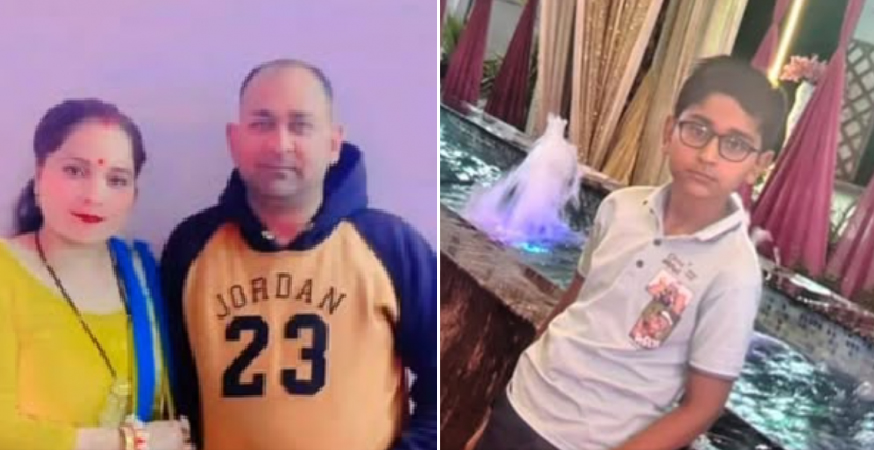 Sanjay Pandita Sanjay Pandita
Early Times Report
Jammu, Sept 14: Heart-wrenching scenes unfolded today in Jammu’s Digiana area as symbolic funeral rites were performed for three members of a family devastated by tragedy. Sahil Sharma, his wife Lovely, and their three-year-old son Raghav were swept away exactly one month ago, on August 14, when a catastrophic cloudburst and flash flood struck Chasoti village in Kishtwar district, along the route to the revered shrine of Machail Mata.
As rituals were carried out, the overwhelming grief and helplessness of Krishna Devi, the mother and mother-in-law, left every onlooker deeply shaken. Refusing to accept the reality, she was not willing to perform the funeral rites for her missing son, daughter-in-law, and grandson. Her tear-streaked face, trembling hands, and vacant eyes silently cried out, “They will return… they are still here… I will not give up hope.”
Despite relatives and neighbors trying to reason with her, explaining that a month had passed and that the symbolic rites were necessary, Krishna Devi kept repeating with heartbreaking conviction: “No… no… they will definitely come back. Raghav’s laughter will call me… they will return…” Her voice faltered as tears streamed down her face.
“Exactly a month has passed since the tragedy,” said advocate Ashwani Kumar, a social activist, while speaking to the Early Times “The chances of survival are almost nil, but the family’s insistence on performing the ceremonial funeral is a reflection of their emotional turmoil.”
Clutching a blurred photograph of her loved ones, Krishna Devi’s fingers tightened around the frame. In it, Sahil, Lovely, and Raghav smiled, their warmth still alive. “This photograph cannot lie,” she whispered. “It tells me they are here… somewhere close…” Her eyes remained fixed on the door, as if expecting the child’s cheerful steps to appear at any moment.
Locals described Sahil as the pillar of the family following his father’s passing – a loving brother to his four sisters and a dutiful son. Lovely, beyond being a daughter-in-law, was a source of strength and affection in the household. Little Raghav’s innocence and laughter once lit up the home, and now only memories of his joy remain, creating an emptiness no words can fill.
The final procession was marked by a haunting silence. No loud wails, no dramatic gestures—only a collective stillness, as if grief itself had silenced everyone. As the silver urns were carried on shoulders toward the crematorium, eyes welled with tears. Some recited prayers softly, while others wiped away their silent sobs.
Krishna Devi sat at the edge of the cremation ground, staring blankly ahead. Her breathing quickened, her lips quivered, but she spoke barely above a whisper. When a neighbor gently held her hand, she pushed it away softly and murmured, “Don’t let them go… they will come soon…” Her words were laced with pain, fear, and unwavering faith.
Later, as darkness enveloped the crematorium and others left, Krishna Devi remained seated, clutching the photograph to her chest. Her face was swollen from weeping, eyes red and exhausted, yet determination shone through her despair. It seemed as if she silently vowed, “As long as I breathe, I will keep waiting…”
Meanwhile, search operations by the local administration and relief teams continue through treacherous mountain paths. Though hope dims with each passing day, Krishna Devi’s resolve stands strong—a testament to her belief in a miracle, that some door will open, that familiar footsteps will echo once again.
The residents of Digiana have embraced the family’s grief as their own. Every day, neighbors, relatives, and friends gather, offering support, sharing tears, and sitting in silence with the grieving family. The tragedy has bound the community together, transforming collective sorrow into an unspoken bond of empathy.
For Krishna Devi, hope is more than a word—it is her lifeline. It keeps her from collapsing under the weight of her loss, though with every new day it also deepens her wounds. She wakes up each morning, touches the photograph, and stares at the door, suspended in a painful memory that refuses to fade.
This story is not just about one family—it embodies the profound depth of human emotion: a mother’s endless wait, a family’s broken foundation, and a community’s unwavering solidarity. Together, these elements keep alive a fragile flame of hope—burning softly beyond tears, amidst pain, and against all odds. |
